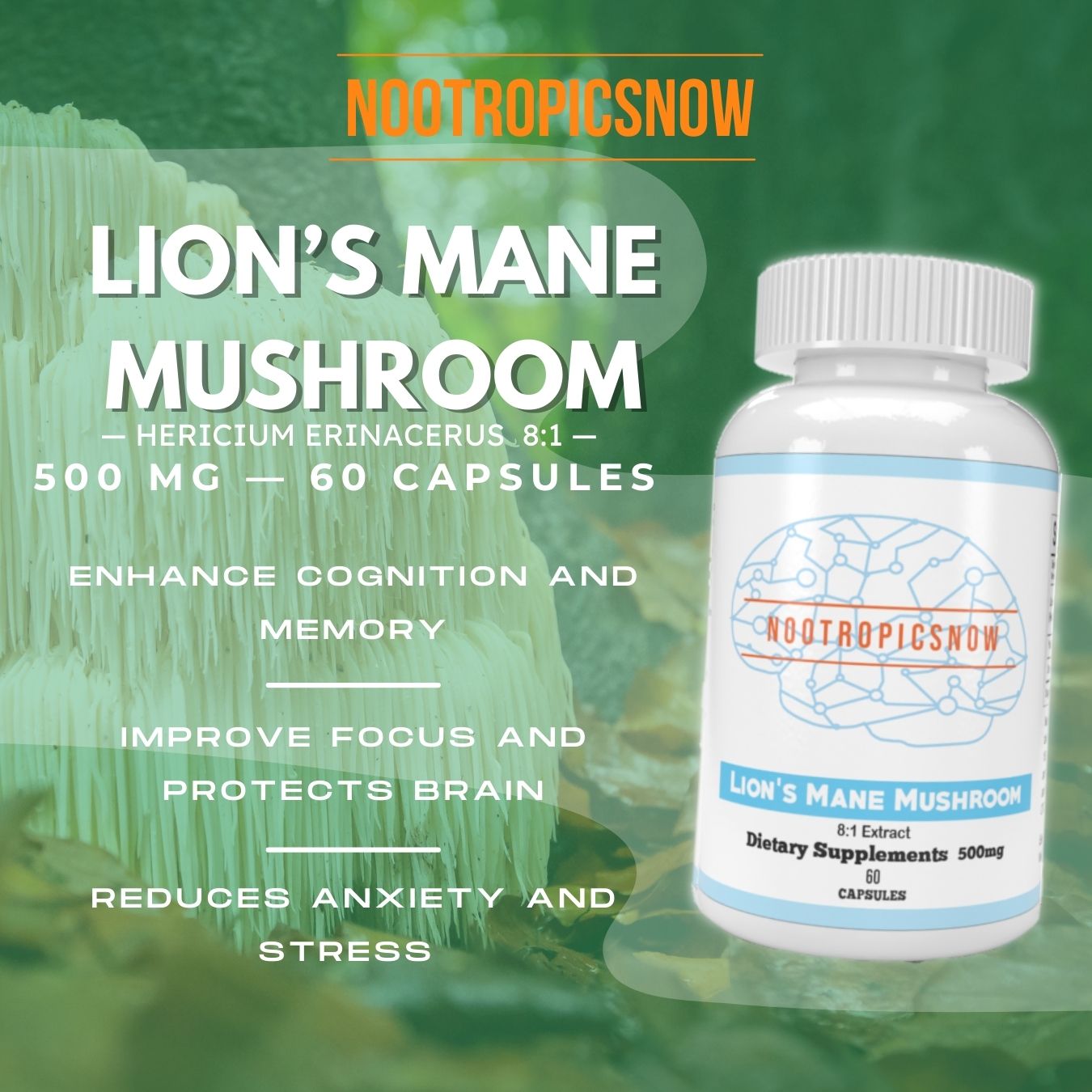Lion’s Mane Mushroom: Benefits & Uses

Lion’s Mane Mushroom: A Comprehensive Guide to Benefits, Uses, and Research
Lion’s Mane mushroom (Hericium erinaceus) is a unique and fascinating fungus that has captured the attention of both culinary enthusiasts and health researchers. Recognized for its distinctive appearance resembling a lion’s mane, this mushroom boasts a long history of use in traditional medicine, particularly in Asia. Today, it garners increasing interest worldwide for its potential cognitive and overall health benefits. Therefore, understanding its properties, uses, and scientific backing can help you make informed decisions about incorporating it into your wellness routine.
Unveiling Lion’s Mane: Identification and Characteristics
Firstly, recognizing a Lion’s Mane mushroom is relatively straightforward. Its most notable feature is its cascading spines of white or off-white color, lacking a cap or stem typically associated with other mushrooms. This unique morphology gives it the characteristic “lion’s mane” appearance. Generally, these mushrooms grow on hardwood trees, especially beech, maple, and oak, often in late summer and fall.
Distinguishing Features:
Consequently, identifying Lion’s Mane in the wild requires careful observation. Be sure to cross-reference with reliable field guides to avoid misidentification, which could lead to consuming inedible or even poisonous fungi.
Nutritional Powerhouse: Composition and Bioactive Compounds
Beyond its peculiar appearance, Lion’s Mane stands out for its impressive nutritional profile. It contains a wealth of bioactive compounds, including polysaccharides, hericenones, erinacines, and various antioxidants. These compounds are believed to contribute significantly to its potential health benefits. Furthermore, it’s a good source of essential minerals like potassium, zinc, and iron, as well as vitamins such as riboflavin and niacin.
Key Nutritional Components:
Therefore, Lion’s Mane provides a wide array of nutrients and bioactive substances that support various physiological functions.
Cognitive Enhancement: The Brain-Boosting Potential of Lion’s Mane
One of the most researched and celebrated benefits of Lion’s Mane lies in its potential to enhance cognitive function. Studies suggest that it can improve memory, focus, and overall cognitive performance, largely attributed to its ability to stimulate Nerve Growth Factor (NGF) production. After all, NGF is crucial for the growth, maintenance, and survival of nerve cells in the brain.
Here’s a product that can help with cognitive enhancement:

View Product
Scientific Evidence for Cognitive Benefits:
However, more extensive research is needed to fully understand the extent of its cognitive benefits and optimal dosages for different populations.
Immune System Support: Fortifying Your Body’s Defenses with Lion’s Mane
In addition to its cognitive effects, Lion’s Mane is believed to bolster the immune system. The polysaccharides, particularly beta-glucans, found in Lion’s Mane are known to have immunomodulatory properties. Subsequently, these compounds can enhance the activity of immune cells, helping the body fight off infections and diseases more effectively.
Mechanisms of Immune Enhancement:
Thus, Lion’s Mane can be a valuable addition to a holistic approach to immune health, supporting overall wellness and resilience.
Mood Regulation: Exploring the Link Between Lion’s Mane and Mental Well-being
Emerging research suggests that Lion’s Mane may also play a role in regulating mood and alleviating symptoms of anxiety and depression. This can be attributed to its ability to reduce inflammation, promote nerve growth, and modulate neurotransmitter activity in the brain. Furthermore, the gut-brain axis is now understood to play a vital role in mental health, and Lion’s Mane’s impact on gut health may also indirectly affect mood.
Potential Mood-Boosting Effects:
However, it’s important to note that these are preliminary findings, and Lion’s Mane should not be used as a replacement for conventional treatments for mood disorders.
Nerve Regeneration and Protection: A Promising Avenue of Research
Besides its cognitive and mood-related benefits, Lion’s Mane holds promise for nerve regeneration and protection. Studies have shown that it can stimulate the growth of nerve cells and protect them from damage. This has implications for treating nerve injuries, neuropathic pain, and neurodegenerative diseases.
Nerve-Related Benefits:
Therefore, further research in this area could lead to novel treatments for various neurological conditions.
Digestive Health Support: Promoting a Healthy Gut Microbiome with Lion’s Mane
Lion’s Mane has shown potential in supporting digestive health by promoting a healthy gut microbiome and reducing inflammation in the digestive tract. Its antimicrobial qualities may contribute to its ability to support a healthy gut microbiome and promote gut health. Some studies suggest it can protect against stomach ulcers and improve symptoms of inflammatory bowel disease (IBD).
Digestive Benefits:
Ultimately, maintaining a healthy digestive system is crucial for overall health, and Lion’s Mane may offer valuable support in this area.
Incorporating Lion’s Mane into Your Diet: Forms and Consumption Methods
Lion’s Mane is available in various forms, making it easy to incorporate into your daily routine. These include:
When purchasing Lion’s Mane supplements, it’s important to choose reputable brands that provide third-party testing to ensure quality and purity. Always follow the recommended dosage instructions.
Dosage and Safety Considerations:
Generally, Lion’s Mane is considered safe for most people. However, some individuals may experience mild side effects, such as digestive upset. It is also recommended to start with a low dose and gradually increase it to assess tolerance. If you have any underlying health conditions or are taking medications, it’s essential to consult with a healthcare professional before taking Lion’s Mane supplements.
The standard dosage of Lion’s Mane supplement is between 300mg to 1000mg daily.
If you are consuming the mushroom in its natural form, consume at least 1-2 ounces every day.
Potential Side Effects
Although Lion’s Mane is generally safe, some potential side effects need to be considered:
Cultivating Your Own Lion’s Mane: A Sustainable and Rewarding Hobby
For those interested in a more hands-on approach, cultivating your own Lion’s Mane mushrooms can be a sustainable and rewarding hobby. The process involves inoculating hardwood logs or sawdust with Lion’s Mane spawn and providing the right environmental conditions for growth.
Steps for Cultivating Lion’s Mane:
Sourcing Lion’s Mane: Where to Buy and What to Look For
Finding high-quality Lion’s Mane products is crucial to ensure you’re getting the full benefits. Here’s what to look for when sourcing:
You can find Lion’s Mane supplements at health food stores, online retailers, and directly from mushroom growers.
Scientific Research: Ongoing Studies and Future Directions
Research on Lion’s Mane mushroom is ongoing, with scientists exploring its potential benefits for a wide range of conditions. Future studies will likely focus on:
Ultimately, the more we learn about Lion’s Mane, the better equipped we will be to harness its full potential for promoting health and well-being.
Conclusion: A Promising Natural Remedy for Cognitive and Overall Health
Lion’s Mane mushroom is a remarkable natural remedy with a wide range of potential health benefits. Its cognitive-enhancing, immune-boosting, mood-regulating, and nerve-regenerating properties make it an attractive supplement for those seeking to improve their overall health and well-being. Furthermore, as research continues to uncover its diverse benefits, Lion’s Mane is poised to become an even more valuable tool in promoting a healthy and vibrant life.
Lion’s Mane Mushroom: A Deep Dive into Benefits, Usage, and Science
Lion’s mane mushroom (Hericium erinaceus) has become increasingly popular. This intriguing fungus, known for its unique appearance resembling a lion’s mane, boasts a range of potential health benefits. Individuals are exploring lion’s mane for its potential to boost cognitive function, support nerve health, and promote overall wellness.
`markdown

View Product
`
We will explore the multifaceted aspects of lion’s mane, including its history, benefits, proper usage, and scientific backing.
Understanding Lion’s Mane Mushroom
Lion’s mane (Hericium erinaceus) is an edible and medicinal mushroom. This mushroom belongs to the tooth fungus group. Its distinctive appearance, characterized by long, cascading spines, makes it easily identifiable.
Origins and Habitat
Native to North America, Asia, and Europe, lion’s mane thrives on decaying hardwood trees. Beech, maple, and oak trees serve as prime hosts for this fascinating fungus. Consequently, finding it in these regions is often possible, particularly in late summer and fall.
Identifying Lion’s Mane
This mushroom is unique because of its shaggy, icicle-like spines instead of the typical gills or pores found on other mushrooms. Young lion’s mane mushrooms are white, but they may turn yellowish or brownish with age. Moreover, look for it on dead or dying hardwood trees in temperate forests. This makes it easier to identify.
Nutritional Profile
Lion’s mane is more than just visually appealing; it is also nutritionally dense. It contains a diverse array of bioactive compounds, including polysaccharides, hericenones, erinacines, beta-glucans, and various antioxidants. These components potentially contribute to the mushroom’s health-promoting effects. Further research validates the nutrition of this rare mushroom.
Lion’s Mane: Unveiling the Health Benefits
Lion’s mane’s health benefits are mainly related to its potent bioactive compounds. These compounds interact with various biological processes. As a result, it helps to boost cognitive function.
Cognitive Enhancement and Brain Health
Lion’s mane has garnered significant attention for its potential to support cognitive function and brain health. Two key compounds, hericenones and erinacines, stimulate the synthesis of Nerve Growth Factor (NGF). NGF plays a crucial role in the growth, maintenance, and survival of nerve cells in the brain.
Mood and Mental Well-being
Beyond cognitive enhancement, lion’s mane has shown promise in supporting mood and mental well-being. Studies have indicated that it helps reduce symptoms of anxiety and depression.
`markdown
View Product
`
Nerve Regeneration and Neuropathic Pain
Lion’s mane’s ability to stimulate NGF has implications for nerve regeneration and the management of neuropathic pain.
Immune System Support
The beta-glucans in lion’s mane contribute to immune system modulation. Beta-glucans are known for their immunomodulating properties.
`markdown

View Product
`
Digestive Health Benefits
Lion’s mane’s potential benefits extend to the digestive system, where it may help to protect against inflammation and support a healthy gut environment.
Other Potential Benefits
Emerging research suggests other potential benefits of lion’s mane. More research is needed in the following areas:
Incorporating Lion’s Mane into Your Routine
There are various ways to include lion’s mane in your diet, from supplements to culinary applications. The method you choose will depend on your lifestyle and needs.
`markdown

View Product
`
Supplement Forms
Culinary Uses
Dosage Guidelines
The appropriate dosage of lion’s mane varies depending on the form and concentration of the product. However, starting with a low dose and gradually increasing it as needed is generally recommended.
When to Take Lion’s Mane
The timing of lion’s mane consumption can influence its effects. Some people prefer taking it in the morning for cognitive enhancement. Others take it in the evening for relaxation and improved sleep. Experimenting with different times can help determine what works best for you.
Potential Side Effects and Precautions
Lion’s mane is generally considered safe, but some individuals may experience mild side effects.
Common Side Effects
Precautions and Interactions
Sourcing Quality Lion’s Mane Products
The quality of lion’s mane products can vary significantly. It is essential to choose reputable brands that conduct third-party testing for purity and potency.
`markdown

View Product
`
Lion’s Mane in the Philippines
Increasing awareness of natural health solutions has increased the availability of lion’s mane in the Philippines. It can be sourced in various forms and from a growing number of retailers.
Where to Buy Lion’s Mane in the Philippines
Legal Considerations
As a dietary supplement, lion’s mane is generally legal to purchase and consume in the Philippines. However, it is always a good idea to check with local regulations. It ensures that you are complying with any specific requirements.
Popular Brands and Products
Several brands offer lion’s mane supplements in the Philippines. Some popular options include:
User Experiences in the Philippines
Many Filipinos have reported positive experiences with lion’s mane. They cite improved cognitive function, mood enhancement, and better sleep quality. Online forums and social media groups often feature discussions and reviews. These experiences can provide valuable insights for prospective users.
Scientific Research and Studies on Lion’s Mane
Numerous studies support the potential benefits of lion’s mane. These studies highlight its impact on cognitive function, nerve health, and overall well-being.
Key Studies
Mechanism of Action
Research is beginning to uncover the underlying mechanisms behind lion’s mane’s effects. Key mechanisms include:
Future Directions in Research
Ongoing research continues to explore the full potential of lion’s mane. Emerging areas of interest include:
Conclusion
Lion’s mane mushroom is a remarkable natural remedy with a wide array of potential health benefits. Its ability to support cognitive function, promote nerve regeneration, and enhance overall well-being has made it a popular supplement. Integrating lion’s mane into your routine, whether through supplements or culinary applications, can be a valuable addition to a holistic approach to health.
As with any supplement, choosing high-quality products and consulting with a healthcare professional before starting supplementation is essential. Embrace the potential of lion’s mane. Discover its unique properties to enhance your cognitive and physical well-being. By combining ancient wisdom with modern science, lion’s mane emerges as a natural ally in the pursuit of a healthier, more vibrant life.
`markdown

View Product
`

